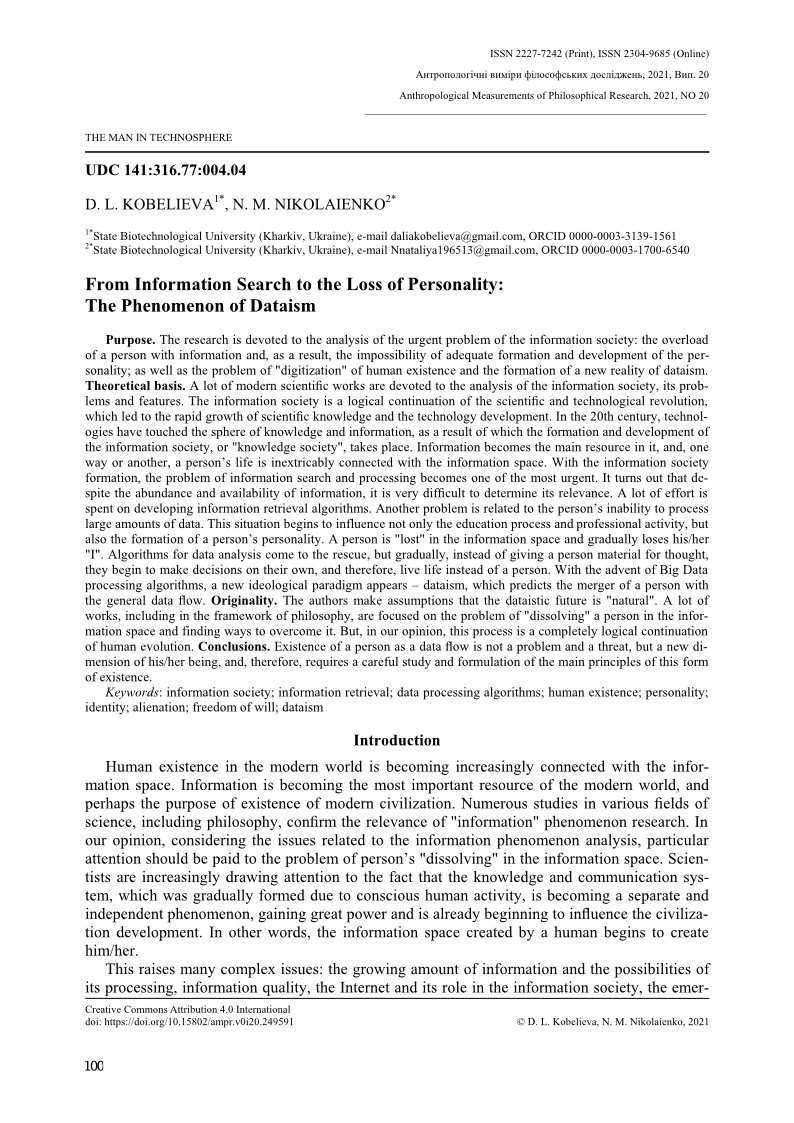
Kobelieva, D. L., & Nikolaienko, N. M. (2021). From Information Search to the Loss of Personality: The Phenomenon of Dataism. Anthropological Measurements of Philosophical Research, (20), 100–112. https://doi.org/10.15802/ampr.v0i20.249591
Destaques
Rui Alexandre Grácio [2024]
«In our opinion, considering the issues related to the information phenomenon analysis, particular attention should be paid to the problem of person’s "dissolving" in the information space.» p. 100
«Humanity is beginning to understand not only the positive factors posed by the freedom of information dissemination and access, but also the threats arising in this regard. There are growing concerns about the loss of human integrity under the pressure of diverse information, the loss of the ability of independent orientation in life (both virtual and real) and the ability to analyze information, as well as the growing trust in data analysis algorithms and decision-making prerogatives. Thus, a person gradually loses him/herself, his/her personality and becomes no longer an information user, but a product of the information environment. The global information network is turning from an assistant into a master. In the near future, a person may face the fact that his/her existence will be possible only as a data flow.» p. 101
«But, in our opinion, despite this, the insufficient attention is paid to the question of the possibility of a new worldview paradigm – dataism. D. Brooks for the first time used this term in the article "The Philosophy of Data". He writes: "If you asked me to describe the rising philosophy of the day, I’d say that it is dataism" (Brooks, 2013). D. V. Popov (2020) also notes: "Before our eyes dataism – the 'religion of data' – is born, a quasi-religious worldview based on faith, hope and love for digital technology” p. 101
«Thus, the problem of human existence in the modern information world or even the problem of coexistence with the information world is one of the determinants of modern philosophy. (…) In this study, we will look at how over the past few decades the following situation has developed that from the problem of information search (which is extremely relevant in the information society or a "society of knowledge") people have moved to the problem of finding themselves, their identity and their personality. We will also consider whether the person of the future needs "personality”.» p. 102
«In the end, it turns out that the information society (or "knowledge society") aimed to accelerate scientific progress based on humanistic ideals, on the contrary, starts destroying the humanistic paradigm.» p. 104
«They are able to collect and analyze unlimited arrays of information, and moreover, use the information obtained to further alienate a person from the process of thinking and making decisions.» p. 105
«Not many people find the prospect of "losing" themselves attractive, but at the same time, stopping the process is hardly possible. One of the possible scenarios is dataism. The concept of dataism is still very young, but, in our opinion, it should be looked at carefully. As a result of the rapid spread of the Big Data, a new phase in the evolutionary development of civilization is emerging – a society based on data.
'The main factor of social transformations is datafication, which involves the transition into quantitative form (into 'data') of all phenomena and aspects of the world around us, even those that were previously understood as purely 'qualitative', not quantifiable: human actions, relationships, desires, moods, etc.' (Kyslova, 2019)» p. 106
«As for dataism, for it, the answer to these questions is obvious – no one and nothing should hinder the data movement. Moreover, the value of anything, including human, is measured by his/her contribution to the information space. The end point of the dataism formation should be the formation of the Internet of Things (IoT). "The Internet of Things (IoT) is a qualitatively new stage in the development of the Web, which allows us to connect (both in space and time) any physical and virtual objects ('things'), processes, various systems using any algorithms, programs or interfaces" (authors’ transl.) (Chekletsov, 2014). Thus, if the Internet technology has allowed free search and dissemination of information, thus realizing the humanistic idea of self development and self-improvement, IoT technology will lead to the need to "lose" oneself and "dissolve" in information. Humanity will be immersed in the digital environment, will be fully digital, virtual (Popov, 2020, p. 26).» (p. 106-107)
«The dataistic future is unlikely to be attractive to human, at least in its modern form. Dataism is often compared to religion because of its commitment to painting images of an "information paradise" and convincing people of the need to be maximally involved in the data flow. Perhaps this is a variant of the modern religious system. But it is important for philosophy to focus on the consequences that the "new future" will have for human existence.» p. 108
«Of course, it is much easier to defeat the enemy if it has a certain image and enters into open confrontation. It is more difficult to win a war when there is no war at all. In our opinion, this is exactly the situation that is happening today. Artificial intelligence does not fight with people, but rather "exhausts" them. It is possible that we are approaching a time when humanity, developing its technology, is gradually exhausting itself. It will not disappear as a result of the victory of "machines", it will simply bring technology to a level where it will no longer make sense to talk about human – human as such will no longer exist. This process will be evolutionary, "painless" and almost unnoticed. In fact, it is already happening.» p. 108

Última atualização em 23 de fevereiro de 2026